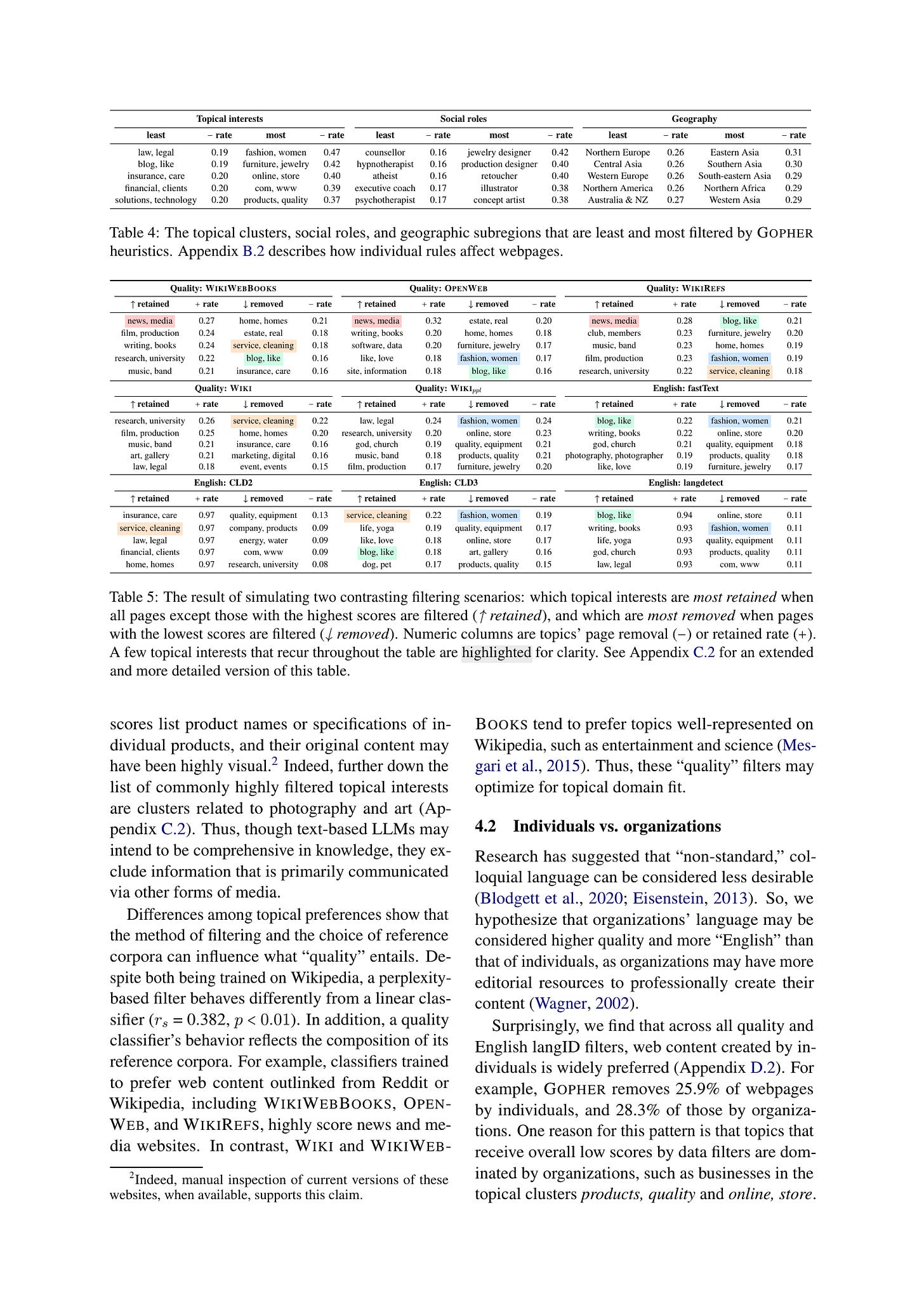2024년 1월 15일
AboutMe: Using Self-Descriptions in Webpages to Document the Effects of English Pretraining Data Filters
(Li Lucy, Suchin Gururangan, Luca Soldaini, Emma Strubell, David Bamman, Lauren Klein, Jesse Dodge)
Large language models' (LLMs) abilities are drawn from their pretraining data, and model development begins with data curation. However, decisions around what data is retained or removed during this initial stage is under-scrutinized. In our work, we ground web text, which is a popular pretraining data source, to its social and geographic contexts. We create a new dataset of 10.3 million self-descriptions of website creators, and extract information about who they are and where they are from: their topical interests, social roles, and geographic affiliations. Then, we conduct the first study investigating how ten "quality" and English language identification (langID) filters affect webpages that vary along these social dimensions. Our experiments illuminate a range of implicit preferences in data curation: we show that some quality classifiers act like topical domain filters, and langID can overlook English content from some regions of the world. Overall, we hope that our work will encourage a new line of research on pretraining data curation practices and its social implications.
굉장히 흥미로운 분석이네요. 프리트레이닝 코퍼스에 적용되는 필터링 방식들(분류기, n-gram LM, 휴리스틱, 언어 분류기 등)이 적용되었을 때 어떤 종류의 문서들을 채택하고 어떤 종류의 문서를 필터링하는지를 분석했습니다.
문서의 종류를 판단하기 위해 웹사이트의 About 페이지를 활용했다는 것도 재미있네요. 분석 결과 쇼핑몰과 동시에 예술 같은 시각적인 페이지가 걸러진다는 것, 단체보다는 개인의 웹사이트가 채택된다는 것, 선호되는 직업들과 지역, 그리고 이런 패턴이 필터링 방법에 따라 어떻게 달라지는지를 관찰했습니다.
필터링 방법들이 꽤 의도대로 작동하고 있다는 생각은 듭니다. (쇼핑몰 페이지들을 거른다는 것 등.) 다만 그렇더라도 프리트레이닝 코퍼스 필터링에 채택하고 있는 방법들과 파이프라인 전반이 어떤 페이지들을 필터링하는지를 좀 더 확인해보는 것은 검증 차원에서도 의미 있겠다 싶네요.
#corpus
The Unreasonable Effectiveness of Easy Training Data for Hard Tasks
(Peter Hase, Mohit Bansal, Peter Clark, Sarah Wiegreffe)
How can we train models to perform well on hard test data when hard training data is by definition difficult to label correctly? This question has been termed the scalable oversight problem and has drawn increasing attention as language models have continually improved. In this paper, we present the surprising conclusion that current language models often generalize relatively well from easy to hard data, even performing as well as "oracle" models trained on hard data. We demonstrate this kind of easy-to-hard generalization using simple training methods like in-context learning, linear classifier heads, and QLoRA for seven different measures of datapoint hardness, including six empirically diverse human hardness measures (like grade level) and one model-based measure (loss-based). Furthermore, we show that even if one cares most about model performance on hard data, it can be better to collect and train on easy data rather than hard data, since hard data is generally noisier and costlier to collect. Our experiments use open models up to 70b in size and four publicly available question-answering datasets with questions ranging in difficulty from 3rd grade science questions to college level STEM questions and general-knowledge trivia. We conclude that easy-to-hard generalization in LMs is surprisingly strong for the tasks studied, suggesting the scalable oversight problem may be easier than previously thought. Our code is available at https://github.com/allenai/easy-to-hard-generalization
쉬운 문제로 학습시켰을 때 어려운 문제에 대한 성능을 높일 수 있는가? 사실 난이도를 정의하는 것부터 쉽지 않죠. 사람 기준으로 평가하는 난이도와 모델 기준의 난이도가 같으리라는 보장은 없고 실제로 꽤 다른 것으로 보입니다.
모델에 대해서 알고자 한다면 모델 기준의 난이도가 의미가 있겠지만, 사람 기준의 난이도도 데이터 구축 비용을 줄여줄 수 있으니 의미가 있겠죠.
여하간 이러한 난이도 지표를 통해 살펴봤을 때 쉬운 데이터로 튜닝했을 때에도 어려운 데이터로 튜닝한 것의 성능을 70% 이상 복원할 수 있는 경우가 많았다는 이야기를 하고 있습니다. 튜닝 방법이나 난이도의 간격 등 변수들이 많긴 하지만 쉬운 문제로 어려운 문제를 풀 수 있다는 것의 함의는 굉장하겠죠. (그리고 어려운 문제로 더 어려운 문제를 풀 수 있는가가 흥미로운 부분이 되겠죠.)
#dataset #in_context_learning






